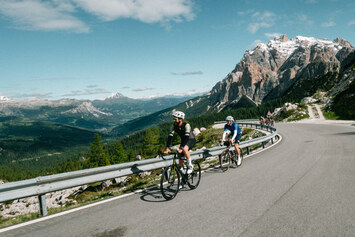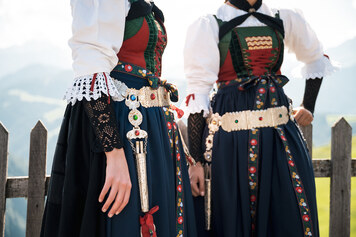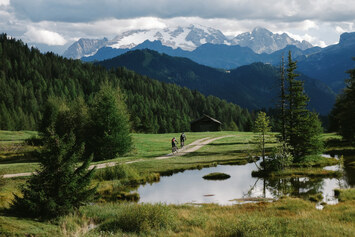The history of these valleys goes back thousands of years and the Ladin culture with its age-old traditions is still very much alive in the typical architecture of the viles (farming villages)...
Alta Badia
Badia is a small village located in the centre of the Ladin region which includes Val Badia, Val Gardena, Val di Fassa, Livinallongo (the valleys around the Sella massif) and the valley of Cortina d'Ampezzo.
-
-
History and traditions
Read more CloseThe history of these valleys goes back thousands of years and the Ladin culture with its age-old traditions is still very much alive in the typical architecture of the viles (farming villages), the graffiti decorations and the traditional costumes. The Ladin language is still spoken today and taught in schools to remind the younger generations of the origins of their people.
In the hotel
:: Library and large information board with the latest up-to-the-minute news on local events
To find out more
:: Visit the website Alta Badia: there you will find the calendar of events and the latest news
:: The Museum Ladin website presents its history as well as the calendar of exhibitions and events held in the castle
:: Not to be missed is the Musem Ladin Ursus ladinicus dedicated to the prehistoric cave bear of the Dolomites.

-
Dolomites & natural parks
The Dolomites have been listed as an UNESCO World Heritage site since 2009. The site of the Dolomites comprises a mountain range in the northern Italian Alps, numbering 18 peaks which rise to...
Read more CloseThe Dolomites have been listed as an UNESCO World Heritage site since 2009. The site of the Dolomites comprises a mountain range in the northern Italian Alps, numbering 18 peaks which rise to above 3.000 metres and cover 141.903 ha, including three regions and five provinces (Trento, Bolzano, Belluno, Pordenone and Udine)
The name of these mountains, deriving from the dolomite mineral which was discovered here by the French scientist Déodat de Dolomieu (1.750- 1.801). The Dolomites are composed of calcium and magnesium carbonate. The particular mineralogical composition is the reason for the natural phenomenon called Alpenglow or "Enrosadira" in Ladin language. At sunset the mountains are being illuminated in magnificent shades of red, from pink to orange and carmine.
Alta Badia is situated in the middle of two natural parks, which belong to the UNESCO World Heritage.
:: Natural park Puez-Odle
The witness of the geological history of the Dolomites
:: Natural park Fanes-Senes-Braies
The natural park, is the glowing face of the Dolomites
To find out more
:: Nature park house Fanes-Sennes-Prags
-
Ladin cuisine
Traditional cuisine in Alta Badia has its roots in the farm cuisine of our ancestors. Dishes such as barley soup, Turtres (fried pastries filled with spinach or sauerkraut), Schlutzkrapfen...
Read more CloseTraditional cuisine in Alta Badia has its roots in the farm cuisine of our ancestors. Dishes such as barley soup, Turtres (fried pastries filled with spinach or sauerkraut), Schlutzkrapfen (Ravioli filled with spinach) or Furtaies (a spiral-shaped, fried dessert) remain some the most popular specialities of Ladin cuisine up to today.





